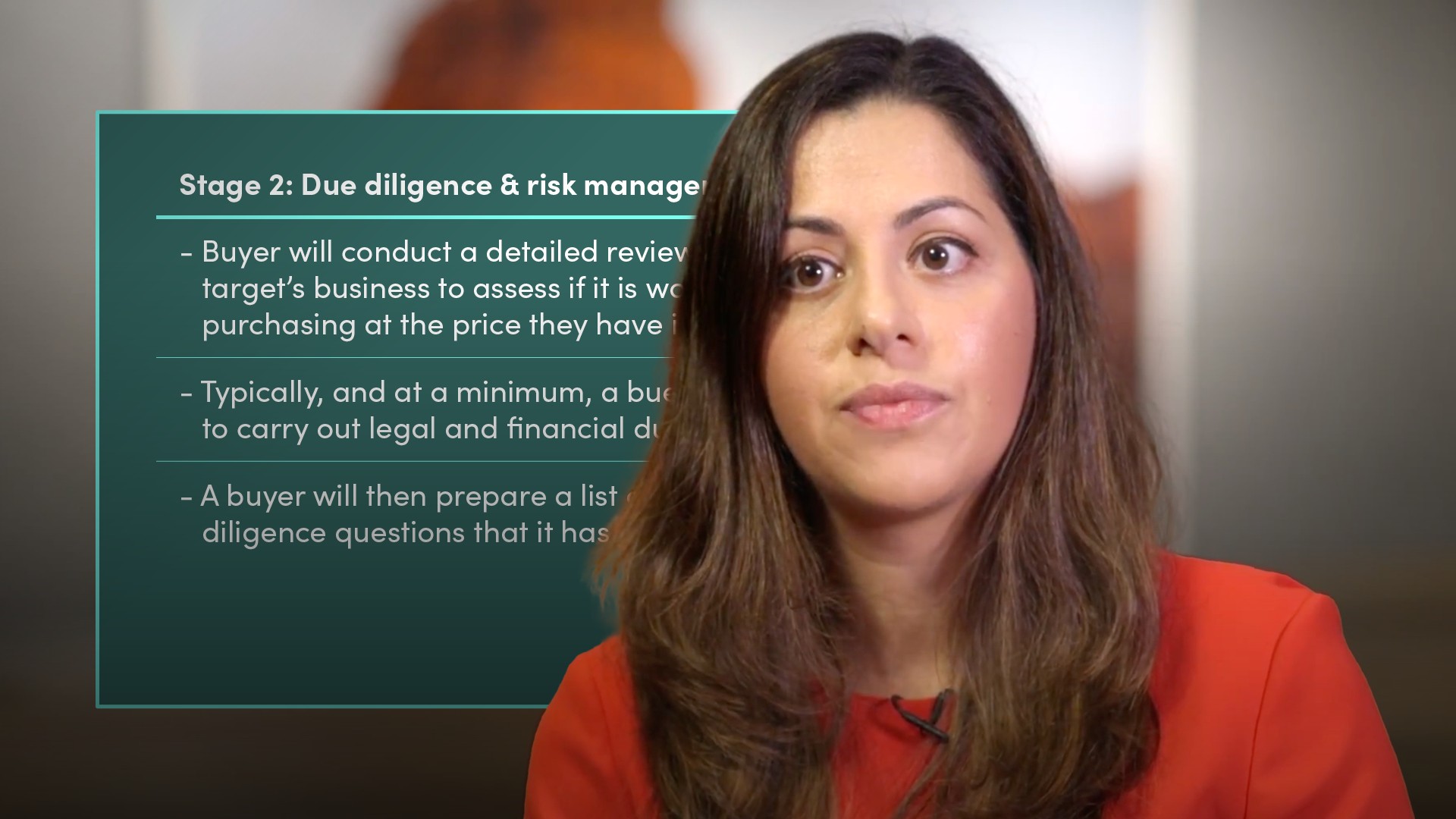
Legal Due Diligence in a M&A Transaction

Elvan Hussein
15 years: M&A legal
Legal due diligence is the process by which a buyer investigates the target business it is intending to buy. Elvan expands on this operation by outlining the objectives of a legal due diligence and describes how this process looks in practice.
Legal due diligence is the process by which a buyer investigates the target business it is intending to buy. Elvan expands on this operation by outlining the objectives of a legal due diligence and describes how this process looks in practice.

Legal Due Diligence in a M&A Transaction
6 mins 20 secs
Key learning objectives:
Define legal due diligence
Outline the purpose of due diligence
Describe the challenges associated with a M&A transaction
Overview:
Legal due diligence is the process by which a buyer investigates the target business it is intending to buy. This process allows the buyer to assess its valuation, determine positive and negative features, and find information to aid integration post-completion. The due diligence process is integral to a M&A transaction, but it is not without challenges, so it is beneficial to understand some steps to make the process smoother.
What is a legal due diligence in a M&A transaction?
Legal due diligence is the process by which a buyer investigates the target business it is intending to buy. A seller is not obliged to disclose any issues or liabilities of the target to a proposed buyer and therefore the buyer will need to conduct its own investigations into the target to extract information about it. Although the seller is not obliged to disclose issues or liabilities, this does not mean they can deliberately misrepresent the facts in the Data Room.What is the purpose of legal due diligence in a M&A transaction?
A legal due diligence serves 3 key purposes:
- Allows the buyer to test the valuation it is attributing to the target business and therefore the price it is proposing to pay for the target
- The buyer will be able to identify positive and negative features of the target business or verify and quantify issues it is already aware of
- Following due diligence, a buyer will be better placed to plan integration of the target into its business, after completion of the transaction
The due diligence process is essentially a buyer's best means of protection from making a bad acquisition.
What are the challenges associated with the due diligence in M&A transactions?
- It can be time consuming and resource heavy (and therefore costly) for both the buyer and the seller
- The extent of due diligence a buyer is able to carry out on the target is dictated by the information a seller has available and is willing to give.
- Scoping the due diligence is important as it is unlikely that the buyer will want to review all contracts (there could be thousands or tens of thousands of contracts)
- The effectiveness and value of due diligence will be limited if information is gathered, analysed and reported on, but not ultimately considered and taken into account during the live transaction and ongoing negotiations
- Due diligence may be limited if a quick sale is the preferred option
What does a typical legal due diligence process look like?
- The buyer will normally commence the due diligence process during the early stages of the transaction
- The buyer and its legal adviser will review information and records provided by the seller in a physical or virtual data room
- The seller may make target's management available for interviews and allow site visits
- The buyer’s due diligence team will submit questions on the target to the seller
- The end result is a legal due diligence report produced by the buyer's legal advisor setting out the legal issues identified within the scope of the due diligence review - categorising issues as 'low, medium and high risk'
What steps can a buyer take to ensure an effective and smooth due diligence process?
- Identify the commercial driver for the acquisition, before commencing due diligence
- The due diligence process is there to test (as opposed to come up with) a valuation or valuation range
- Without an assessment and clear understanding of the reasons for doing a deal, all of the issues that arise from due diligence are potential deal breakers
- Identify the potential areas of risk early on
- Consider what the seller's rationale for disposing of the target is
- Focus on scoping and planning early on
- The amount of time and financial resources available to conduct due diligence will impact the scope and the materiality threshold it applies to the due diligence
- Always prepare a due diligence report, even if a seller instructs its own legal adviser to conduct due diligence on the target it is selling
- Otherwise, it is difficult for the buyer to chip at the purchase price
- This approach is often taken by sellers disposing of a target pursuant to an auction process and needs to create a vendor due diligence report
- A buyer would typically still prepare its own due diligence report in order to still bring a claim against the adviser that prepared the vendor due diligence report in circumstances where the report is inaccurate or incomplete

Elvan Hussein
There are no available Videos from "Elvan Hussein"

